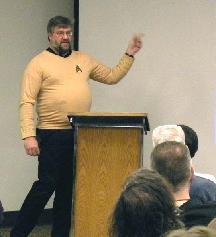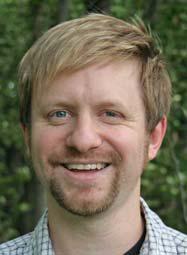April News and Notes
By George Kane
Michael Newdow lost the first round of his suit to end the practice appending, in violation of the constitutionally prescribed script, the words ‘so help me God' to the presidential oath of office. But he asserted that the loss is actually a good thing:
It may sound disingenuous, but I have always advocated for losing in the District Court if possible. Basically - except for findings of fact (which rarely exist in constitutional cases such as this) - it is advantageous to lose. As the loser, you are the Appellant in the next round. That allows you to frame the issues, since you go first during the briefing. The Appellant starts with a maximum 14,000 word Opening Brief. The ‘winners' then have a 14,000 word limit to respond with their Respondent Briefs. Then the loser gets to speak last, with a 7,000 word Reply Brief.
During the oral argument, the advantage persists. The Appellant goes first, and then can reserve time for rebuttal, so that [the appellant] goes last as well.
So pop the Champagne, and get ready for the round that really counts. Of course, we may lose again there, in which case the litigation will essentially be over (since the Supreme Court will never accept the case for certiorari if we lose in the Court of Appeals). But we have a very strong case, with that little detail called the Constitution of the United States on our side. So, in my opinion, at least, we're in very good shape.
The new President and congress dominated church/state separation news at the beginning of the year, but now the focus has returned to the courts and state legislatures. I have a personal interest in one court case that the religious right is appealing, from my native California and my alma mater University of California. The conservative Christian plaintiffs claim that the University of California is discriminating against the students from religious high schools when they reject classes for meeting admissions requirements. UC requires incoming freshmen to have taken 15 specific classes in high school, in math, science, English, foreign language, and social studies. In the case Association of Christian Schools International v. Stearns, plaintiffs claim that ‘UC has targeted courses that emphasize disfavored religious viewpoints, such as the idea that God has influenced human history and provides a universal, unchanging standard of truth and morality.' All incoming freshmen must have passed in high school a class in World History. Their complaint is that UC has refused to recognize for this requirement such courses as the Holocaust, Jewish Leadership, Jewish Philosophy, Women in Scripture, Moral Theology, History of Christianity, and Catholic Traditions. I'm sorry, but how broad is the knowledge of World History that a student receives in any of these classes? The only point of the suit seems to be to foster a sense of victimhood among conservative Christians.
In East Brunswick New Jersey, high school football coach Marcus Borden's fight for the right to lead his team in prayer before games has come to a legal dead end. When the school ordered him to desist, Borden originally won in federal court. How in the world can that possibly happen? With pro bono assistance from Americans United for Separation of Church and State, the school district had that ruling reversed on appeal. The final word on the story is that SCOTUS has refused to hear the case, exhausting Coach Borden's appeals.
Late last year, Louisiana enacted a Science Education Act to promote ‘open and objective discussion of scientific theories being studied including, but not limited to, evolution, the origins of life, global warming, and human cloning.' Drafted by the conservative Christian Louisiana Family Forum (LFF), the bill promises support for teachers who ‘use supplemental textbooks and other instructional materials to help students understand, analyze, critique, and review scientific theories,' providing cover for teachers to promote Intelligent Design as science.
National science organizations are responding by boycotting Louisiana. The Society for Integrative and Comparative Biology, with more than 2300 members, has moved its 2011 convention from New Orleans to Salt Lake City. The boycott has been joined by the American Society for Biochemistry and Molecular Biology (ASBMB). Losing these large conventions will add to Louisiana's financial crisis.
In Mississippi, Representatives Chism and Espy have introduced House Bill No. 25. Can you read it without breaking out in laughter?
The State Board of Education shall require every textbook that includes the teaching of evolution in its contents to include the following language on the inside front cover of the textbook: "The word ‘theory' has many meanings, including: systematically organized knowledge; abstract reasoning; a speculative idea or plan; or a systematic statement of principles. Scientific theories are based on both observations of the natural world and assumptions about the natural world. They are always subject to change in view of new and confirmed observations. This textbook discusses evolution, a controversial theory some scientists present as a scientific explanation for the origin of living things. No one was present when life first appeared on earth. Therefore, any statement about life's origins should be considered a theory.
Evolution refers to the unproven belief that random, undirected forces produced living things. There are many topics with unanswered questions about the origin of life which are not mentioned in your textbook, including: the sudden appearance of 24 the major groups of animals in the fossil record (known as the Cambrian Explosion); the lack of new major groups of other living things appearing in the fossil record; the lack of transitional forms of major groups of plants and animals in the fossil record; and the complete and complex set of instructions for building a living body possessed by all living things. Study hard and keep an open mind."
Nearly identical language is written into a bill just introduced in the Texas House of Representatives. The bill would additionally restore language requiring the teaching of the ‘strengths and weaknesses' of scientific theories. That language had been previously removed at the insistence of Texas' leading scientific societies and over 1400 scientists in Texas, because its intent was to baldly introduce Intelligent Design into science classrooms as an alternative to evolution. The bill additionally stipulates that ‘no student in any public school or institution shall be penalized in any way because he or she subscribes to a particular position on scientific theories or hypotheses.' In other words, any explanation is just as good as any other.
Another new bill in the Texas legislature would exempt private, nonprofit educational institutions that do not accept state funding and state-administered federal funding from approval by the Texas Higher Education Coordinating Board to award academic degrees. This is because the Board unanimously refused to permit the Creation Research Institute to offer an online master's degree in science education. If the bill passes, Texas will surely become a magnet for fraudulent organizations offering advanced degrees for sale.


 By James
Zimmerman
By James
Zimmerman
 By
Mike Haubrich
By
Mike Haubrich
 By James Zimmerman
By James Zimmerman
 By Ryan Sutter
By Ryan Sutter
